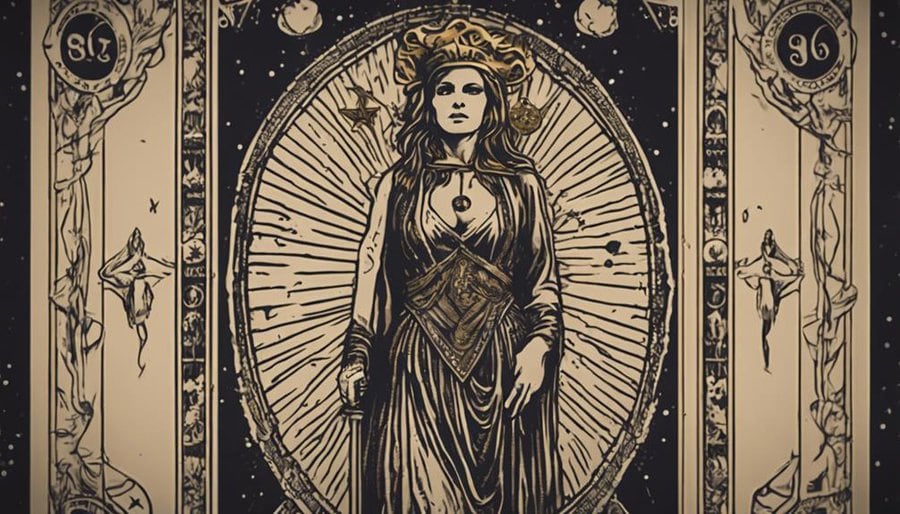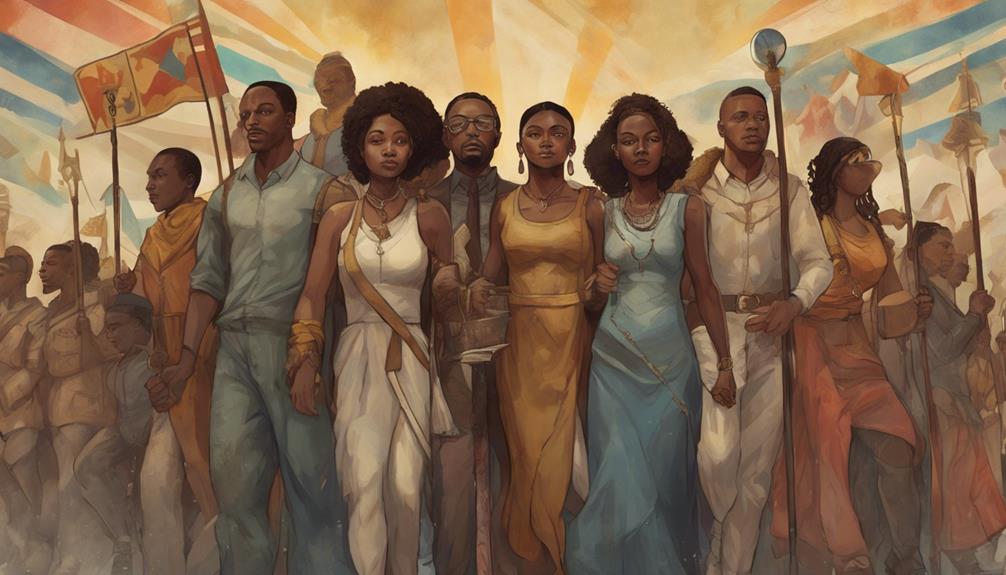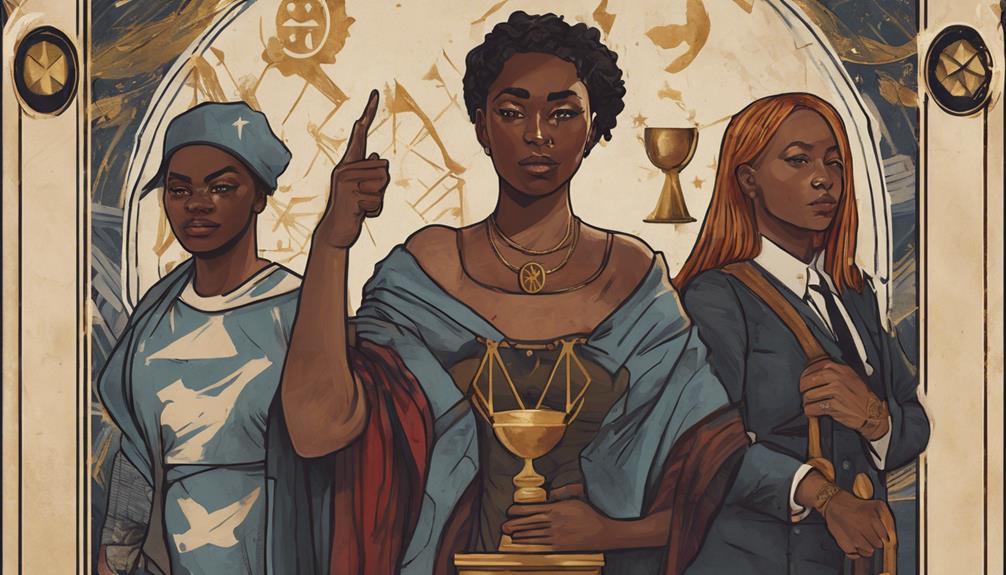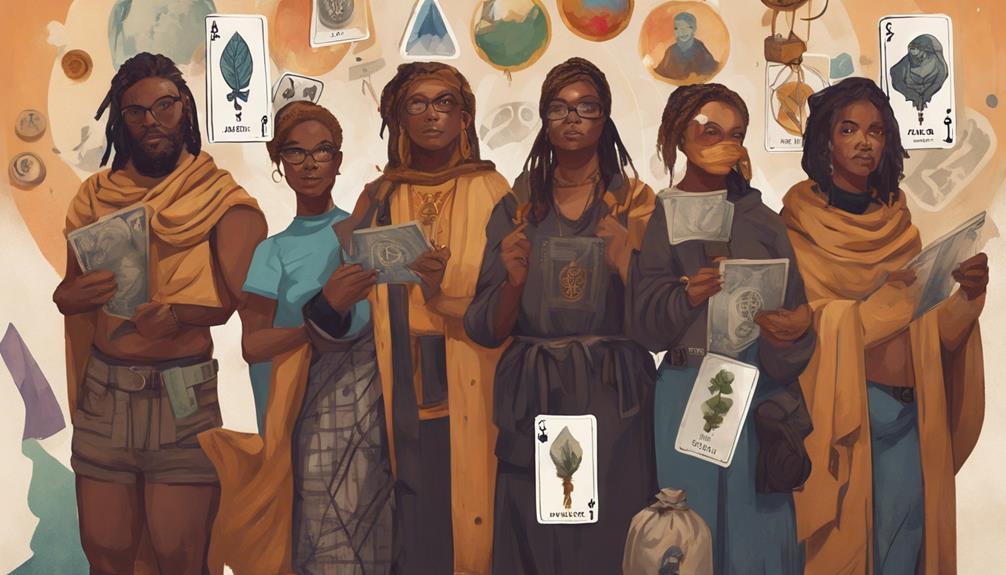When Tarot Cards Reflected Revolutionary Political Ideals

Tarot cards reflect revolutionary political ideals throughout history, from the French Revolution to the civil rights movements. Their symbolism resonates with those seeking social transformation, intertwining with political movements.
This intersection of mysticism and activism offers a unique perspective on societal evolution.
Origins of Tarot and Political Symbolism
The origins of Tarot intertwine with political symbolism, revealing a rich tapestry of historical significance and ideological connections. Tarot, believed to have originated in the 15th century in Europe, wasn't initially associated with mysticism but served as a tool for entertainment and political allegories. The intricate imagery and symbolism found in Tarot decks were reflective of the societal structures and power dynamics of the time. The cards often depicted scenes of authority, hierarchy, and moral virtues, mirroring the political landscape of the era.
Through the lens of political allegories, Tarot cards were used to convey moral lessons, political commentary, and even propaganda. The intricate designs and symbolic representations on the cards were crafted with a purpose beyond mere fortune-telling. They served as a visual medium through which political ideals, power struggles, and social norms were communicated and reinforced. The origins of Tarot as a vehicle for political symbolism laid the foundation for its evolution into a tool that could be wielded to challenge authority, inspire change, and advocate for freedom.
Tarot Cards During French Revolution
During the tumultuous times of the French Revolution, Tarot cards took on new significance, embodying revolutionary ideals and serving as powerful symbols of change.
The imagery of the cards influenced art and propaganda of the era, reflecting the political unrest and fervor for transformation.
Popular interpretations of Tarot during this period often aligned with the revolutionary spirit, inspiring hope and reflecting the desire for a new societal order.
Revolutionary Symbolism in Tarot
Amidst the fervor of the French Revolution, Tarot cards emerged as powerful vessels of revolutionary symbolism, embodying the spirit of upheaval and transformation.
These ancient cards, traditionally used for divination, took on new meanings during this turbulent period, reflecting the revolutionary ideals of the time. The imagery on the cards was reinterpreted to convey political messages, inspiring hope and inciting change among the people.
The Tarot decks became a mirror of the societal unrest and desire for freedom, offering a glimpse into the collective consciousness of a nation in revolution. As the cards were shuffled and dealt, they whispered tales of liberation, equality, and the relentless pursuit of a better tomorrow.
Influence on Art
As the French Revolution unfolded, Tarot cards underwent a metamorphosis, inspiring a wave of artistic expression that vividly captured the revolutionary fervor pulsating through society.
Artists of the time found in Tarot cards a wellspring of inspiration, using their symbolic imagery to create powerful artistic interpretations that reflected the radical shifts occurring in French society.
These creative expressions served as a mirror to the tumultuous times, depicting themes of upheaval, liberation, and societal transformation.
Through their art, these visionaries not only captured the essence of the revolution but also contributed to shaping the collective consciousness of the era.
The fusion of Tarot symbolism with artistic creativity became a potent tool for conveying the aspirations and struggles of a society in the throes of profound change.
Popular Interpretations
Tarot cards during the French Revolution sparked a myriad of popular interpretations, illuminating the zeitgeist of a society in radical transformation. These interpretations resonated deeply with individuals seeking liberation and equality. The cards became a symbol of hope and empowerment during a time of upheaval and change. They inspired people to envision a future where all voices were heard and all were treated with fairness and respect.
The following list encapsulates the emotional journey experienced by many as they explored into the meanings of the tarot cards in this revolutionary era:
- A surge of empowerment and courage swept through those investigating the cards.
- The imagery on the cards spoke to the longing for equality and justice.
- Feminist perspectives found solace and inspiration in the symbolism of the tarot.
- The cards became a mirror reflecting the aspirations of civil rights movements.
Tarot's Influence in Feminist Movements
The intertwining of Tarot with feminist movements has been a source of empowerment and insight for women throughout history.
The symbolism and archetypes present in Tarot cards have served as a mirror to reflect the struggles and strengths of women, inspiring them to embrace their own power and voice.
Feminist Tarot History
In the domain of feminist movements, the intricate symbolism and archetypes found within tarot cards have played a significant role in shaping a narrative of empowerment and self-discovery.
Feminist empowerment through tarot is a journey of reclaiming personal power and embracing individuality. The historical symbolism embedded in tarot decks resonates with the struggle for equality and liberation.
Through feminist interpretations, tarot has become a tool for challenging societal norms and advocating for women's rights. It serves as a mirror reflecting the strength and wisdom that lie within every woman, encouraging a deep exploration of one's inner being and a celebration of femininity.
- Discovering inner strength
- Challenging societal norms
- Embracing individuality
- Celebrating femininity
Empowerment Through Tarot
Embracing the transformative power of tarot cards, feminist movements have found a profound catalyst for empowerment and self-discovery. Through the intricate symbolism and intuitive nature of tarot readings, individuals within these movements have tapped into a source of inner strength and insight.
Tarot has provided a platform for exploring one's own identity, questioning societal norms, and seeking guidance on the path towards empowerment. The cards serve as mirrors, reflecting the depths of one's being and offering a space for contemplation and growth.
In feminist circles, tarot has become a tool for reclaiming power, fostering self-awareness, and embracing the journey of self-discovery. It stands as a symbol of liberation and a means to connect with the profound wisdom that resides within each individual.
Tarot and Civil Rights Era

During the Civil Rights Era, the intricate symbolism of Tarot cards found resonance with individuals seeking justice and equality. The Tarot became a tool not only for divination but also for reflection and empowerment in the fight against oppression and discrimination.
Here are four ways in which Tarot intertwined with the Civil Rights Movement:
- Hope: Tarot cards offered a beacon of hope during dark times, reminding activists that change wasn't only possible but inevitable.
- Empowerment: Drawing strength from the symbolism of the cards, individuals felt empowered to stand up against injustice and fight for their rights.
- Unity: Tarot served as a unifying force, bringing together people from diverse backgrounds under a common cause of social justice and equality.
- Guidance: The Tarot provided guidance and clarity in tumultuous moments, offering insights and perspectives that fueled the determination of those fighting for civil rights.
In the hands of activists, Tarot cards became more than just symbols on paper; they became mirrors reflecting the collective struggle for a more just and equitable society.
Tarot in Anti-Colonial Struggles
Symbolizing resistance and resilience, Tarot cards emerged as potent tools in the narratives of Anti-Colonial Struggles. During decolonization struggles, Tarot became a symbolic language through which indigenous resistance was articulated and preserved. The cards served as mirrors reflecting the complexities of these movements, offering insights into the challenges faced and the paths to liberation.
In Anti-Colonial Struggles, Tarot decks weren't just divination tools but also sources of empowerment and solidarity. The archetypes and symbols depicted in the cards resonated with the experiences and aspirations of those fighting against colonial oppression. Each draw of the cards held the promise of guidance, inspiration, and validation for individuals and communities engaged in the struggle for self-determination.
Through Tarot, narratives of resistance were woven, affirming the strength and endurance of indigenous peoples in the face of colonial violence and erasure. The cards became vessels of cultural memory, carrying within them the stories of survival and resurgence that continue to inspire freedom fighters around the world.
Modern Political Tarot Readings

In the domain of modern political discourse, Tarot readings have increasingly become a tool for gaining fresh perspectives on pressing societal issues and power dynamics. Modern interpretations of Tarot cards explore the intricate web of political symbolism, offering insightful reflections on the state of the world. Here are four ways in which modern political Tarot readings captivate and empower individuals seeking freedom:
- Challenging the Status Quo: Tarot cards serve as a mirror, encouraging individuals to question existing power structures and advocate for change.
- Inspiring Activism: The imagery and symbolism in Tarot decks can ignite a fire within individuals, motivating them to engage in political activism and social justice movements.
- Promoting Critical Thinking: Through Tarot readings, individuals can develop a deeper understanding of political issues, fostering critical thinking skills essential for handling complex societal challenges.
- Encouraging Empowerment: Modern political Tarot readings empower individuals to reclaim their agency and envision a world where freedom and equality prevail.
Tarot Art Reflecting Political Themes
How does Tarot art creatively express and embody political themes in a visually evocative manner? Tarot art often reflects political themes through cultural appropriation and symbolism, drawing on historical context for interpretation. Artists use the rich tapestry of Tarot symbolism to convey powerful messages about societal issues, activism, and political change. The visual nature of Tarot cards lends itself well to exploring complex political ideas in a way that resonates deeply with viewers.
| Symbolism | Cultural Appropriation | Historical Context |
|---|---|---|
| Archetypes | Social Movements | Revolution |
| Power Dynamics | Diversity | Social Justice |
| Transformation | Resistance | Equality |
| Unity | Intersectionality | Liberation |
| Balance | Empowerment | Solidarity |
Tarot's Role in Contemporary Activism

Tarot art, with its intricate symbolism and deep cultural resonance, continues to serve as a potent tool for contemporary activism, channeling the spirit of social change and empowerment.
In the domain of Tarot activism, individuals harness the power of tarot cards to advocate for social justice causes and challenge oppressive systems. This form of political tarot empowers activists to envision a more just and equitable world, inspiring them to take action and effect real change.
Through the lens of Tarot, activists find strength and courage to dismantle structures of inequality and advocate for marginalized communities. The transformative nature of Tarot art fuels the fire of social change, igniting a passion for justice and liberation.
As contemporary activists draw upon the wisdom of Tarot cards, they tap into a rich tradition of symbolism and meaning, infusing their movements with intention and purpose. Tarot's role in activism today is a confirmation of its enduring relevance and power in the fight for a better world.
Frequently Asked Questions
Can Tarot Cards Accurately Predict the Outcomes of Political Events?
Tarot cards, steeped in symbolism, can offer intriguing insights into political events. While they may not predict outcomes with precision, they can provide perspectives and reflections that spark contemplation and inspire change.
How Have Different Cultural and Religious Beliefs Influenced the Interpretation of Political Symbolism in Tarot Cards?
Cultural influences and religious beliefs have deeply shaped the interpretation of political symbolism in tarot cards. These diverse perspectives enrich the understanding of societal dynamics, offering a nuanced lens through which to explore governance and power dynamics.
Are There Specific Tarot Card Spreads or Layouts That Are Commonly Used for Political Readings?
Do specific tarot card layouts influence political decisions? How accurate are political tarot predictions? The layout of tarot cards can shape perspectives on political matters, potentially offering guidance and insight into complex issues and future outcomes.
How Do Modern Tarot Readers Reconcile the Historical Origins of Tarot With Contemporary Political Movements?
Modern tarot readers navigate the ethical implications of historical context by blending social justice with spiritual practice. They harmonize the origins of tarot with contemporary political movements, honoring tradition while embracing progressive ideals.
Are There Any Notable Political Figures Who Have Publicly Endorsed or Used Tarot Cards for Guidance in Decision-Making?
Celebrity endorsements of tarot for guidance have increased, with notable figures like Lady Gaga and Jay-Z publicly expressing their use. The practical applications of tarot extend beyond mystical beliefs, inviting introspection and alternative perspectives.











